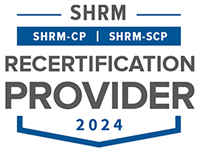
The use of this seal confirms that this activity has met HR Certification Institutes (HRCI) criteria for recertification credit pre-approval.
This activity has been approved for
1 HR
(General) recertification credit hours toward aPHR, PHR, PHRca, SPHR, GPHR, PHRi and SPHRi recertification through HR Certification Institute (HRCI). Please make note of the activity ID number on your recertification application form. For more information about certification or recertification, please visit the HR Certification Institute website at www.hrci.org." ...more
 Traininng.com LLC is recognized by SHRM to offer Professional Development Credits (PDCs) for the SHRM-CP® or SHRM-SCP®.
?
Traininng.com LLC is recognized by SHRM to offer Professional Development Credits (PDCs) for the SHRM-CP® or SHRM-SCP®.
?
1-hour educational program = 1 PDC.
1-hour and 15 minute concurrent conference session = 1.25 PDCs.
3-hour e-learning course = 3 PDCs.
Overview
Addressing generational differences starts with examining the unconscious biases we may bring to our work conversations and interactions.
We will then explore the key events each generation experienced and how that has colored their worldview. Lastly, we’ll discuss approaches that help bridge the divide and get the generations to collaborate more effectively.
Topics covered include:
- How do our thinking and unconscious biases about other generations influence our behavior toward them
- The importance of being transparent and surfacing our assumptions for examination
- A framework for recognizing and appreciating those differences
Why you should Attend
We work in times where rapid change is the norm. This means that our younger workforce is coming of age earlier. As a result, without some consciousness rising for all generations, each generation is feeling crowded out by the other! Tensions arise and productivity declines when it could instead soar!
This workshop is designed for exploring what it means to have 3-4 generations working alongside each other in flatter organizations where concepts like “tenure” and “company loyalty” are being reexamined. We will also look at time-tested practices that take us from focusing on differences as vehicles for blaming and instead, see differences as strengths to be leveraged.
Areas Covered in the Session
- How our unconscious biases cause us to "see what we want to see"
- Google's research into diversity in teams and what makes for effective teams
- Practices that get us past our surface stories about others and take us to common interest
Who Will Benefit
Speaker Profile
Rich McLaughlin Rich has been an observer and practitioner of innovation and employee engagement processes for over 20 years. He has over 13,000 hours designing and facilitating leadership and interpersonal skills workshops, and innovation explorations with teams to help them jump start their change and innovation efforts.
He has helped teams as small as 8 and departments as large as 100 learn how to blend external developments (to understand where customer needs are moving) with internal employee engagement processes (to show how to stimulate internal experiments and capitalize on those opportunities). Rich also enjoys helping leaders grow by focusing more on people skills and less on technical ones. He brings an experiential approach in his work with client teams. His client’s value the engaging way he works with their people whether facilitating a leadership workshop, working with a specific team, or challenging employees to be more accountable for the whole.
Rich spent time learning about instructional design and change management at Accenture, helped Square D Company develop and implement their TQM programs and processes and developed the leadership curriculum and internal consulting practice at Baxter Healthcare during his time as an internal OD practitioner. The last 8 years of his practice he has been following the intersection of Innovation and Design Thinking.
Rich received his M.A. in Training and Development for Business from Ohio State University, and has been consulting faculty for the University of Notre Dame’s College of Business since 2000. He is author of, Rules of Engagement: A Story About How Leaders Can More Effectively Engage Employees. And he co-authored Tapping Team Intelligence: Exercises that connect team members, engage their creativity and foster collaboration.

 Traininng.com LLC is recognized by SHRM to offer Professional Development Credits (PDCs) for the SHRM-CP® or SHRM-SCP®.
?
Traininng.com LLC is recognized by SHRM to offer Professional Development Credits (PDCs) for the SHRM-CP® or SHRM-SCP®.
?